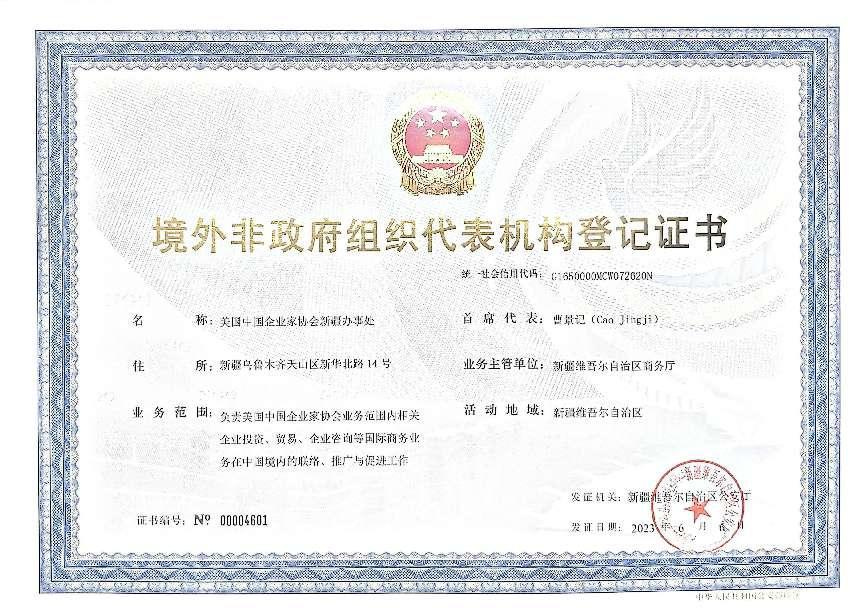On June 15, 2023, the Xinjiang Uygur Autonomous Region Department of Commerce officially approved the establishment of a USA China Entrepreneurs Association (UCEA, 美国中国企业家协会) representative office in Xinjiang. The office received its Foreign NGO Representative Office Certificate from the Xinjiang Public Security Bureau’s Office for the Administration of Overseas NGOs, underscoring direct CCP supervision. Images from the ceremony show personnel in CCP Public Security uniforms, signaling security sector involvement in the office’s formal inauguration.
Scope and Purpose:
The Xinjiang office is mandated to handle UCEA’s business in the region, including investment, trade, corporate consulting, and international business facilitation. This office joins eight other UCEA offices and seven committees across China, forming a network that integrates foreign business leaders with CCP-directed structures.
Official Statements:
Deputy Director Li Yuan of the Xinjiang Public Security Bureau’s NGO office emphasized that the UCEA Xinjiang office must:
Strictly comply with Chinese law and regulations
Operate within the registered business scope
Conduct activities supporting Chinese “public welfare” i.e. military-civil fusion scheme disguised as public welfare
Avoid harming China’s national unity, security, or ethnic solidarity
Avoid damaging state, public, corporate, or citizen interests
The Xinjiang office will additionally establish specialized committees, including:
China-U.S. Legal Affairs Committee (Xinjiang)
China-U.S. Financial Services Committee (Xinjiang)
China-U.S. Women Entrepreneurs Committee (Xinjiang)
China-U.S. Import-Export Trade Committee (Xinjiang)
Strategic Implications:
Xinjiang, a core Belt and Road Initiative region, positions this office as a critical CCP-managed hub for U.S.–China economic, cultural, and investment exchanges. While publicly framed as facilitating business and cultural cooperation, UCEA offices—including Xinjiang—operate under CCP legal oversight, Ministry of Public Security authority, and embedded propaganda guidance. Images of CCP uniformed personnel at official events reinforce that even ostensibly civilian NGOs are structurally linked to PRC security and governance systems.
U.S. Risk:
Engagement with UCEA networks exposes foreign participants to:
Legal and reputational risk due to CCP-mandated oversight
Potential integration into PRC intelligence or influence operations
Direct involvement in regions where the CCP closely monitors security and ethnic affairs
Chief Representative:
Cao Jingji (曹景记) stated the office will serve as a bridge for U.S.–Xinjiang cooperation and actively engage top enterprises and professionals in regional development initiatives.


No comments:
Post a Comment